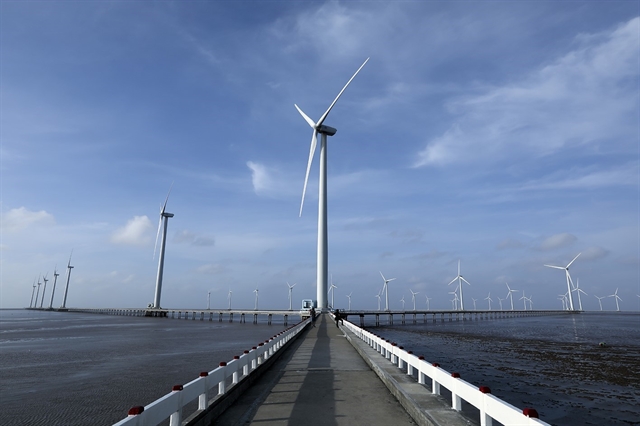 Environment
Environment

 |
| Bạc Liêu Wind Farm, located in Vĩnh Trạch Đông Commune, Bạc Liêu Province, has 62 turbines on the coast with the designed capacity of 99MW. — VNA/VNS Photo Phan Tuấn Anh |
HÀ NỘI — To promote green energy transition and achieve the net zero emissions goal by 2050, experts recommended that Việt Nam quickly establish a comprehensive legal policy framework and offer more favourable financial mechanisms to facilitate effective and sustainable development of renewable energy.
They suggested key ministries, including the Ministry of Natural Resources and Environment and the Ministry of Industry and Trade, study and introduce pilot mechanisms for developing green and renewable energy, particularly offshore wind power.
Director of the Institute of Strategy and Policy on Natural Resources and Environment, Nguyễn Đình Thọ, emphasised that energy transition towards net zero goal is a core focus of global environmental policy. This involves not only reducing greenhouse gas emissions but also developing an efficient and sustainable energy system.
The National Strategy for Climate Change until 2050 targeted to reduce emissions from the energy sector by 32.6 per cent by 2030, with total emissions not exceeding 457 million tonnes of carbon dioxin equivalent.
Việt Nam has further committed to reaching net-zero emissions by 2050.
To achieve this target, Thọ asserted that transitioning from traditional energy sources, such as environmentally harmful fossil fuels, to green and renewable energy sources is essential.
However, he cautioned that for developing countries like Việt Nam, this energy transition faces financial challenges as it requires advanced technology investment and significant institutional and policy reforms.
"This transition demands coordinated efforts between the Government, investors and financial institutions, with enterprises taking the lead, and support from the international community," he said.
Citing experiences from regional countries, Thọ noted that the focus on transitioning coal-fired power plants using green finance has been underway for years in Indonesia. Similarly, the Philippines has successfully implemented biomass co-firing at several major power plants.
Therefore, he recommended that the Government have mechanism to encourage investment in renewable energy projects, particularly solar and wind power, to reduce the dependency on fossil fuels and protect the environment.
“One of the most crucial mechanisms is a fixed price policy (Feed-in Tariff) that enables renewable energy producers to receive preferential rates, facilitating cost recovery and ensuring sustainable profits,” Thọ said.
Adding to the solutions for promoting green energy transition and achieving net zero goal in Việt Nam, Dư Văn Toán from the Institute of Environmental Science, Marine and Islands suggested that authorities focus on developing a science and technology programme on green and renewable energy, especially offshore wind power.
Additionally, relevant authorities need to assess the technical potential of offshore wind power and renewable and green energy throughout Việt Nam’s exclusive economic zone. This includes planning offshore wind farms, particularly non-grid-connected ones that can supply islands and facilitate future green hydrogen and ammonia production, among other significant benefits.
Việt Nam should also conduct research to develop and approve a strategic master plan for green and renewable energy, which includes standardising sea maps, boundaries and measurements.
“It’s important to research and issue pilot breakthrough mechanisms for the development of green and renewable energy, including offshore wind, by 2030 to jump-start the growth of offshore wind energy,” Toán stressed.
Sharing the same point of view, Vũ Văn Doanh, deputy head of the Environemental Faculty at the Hà Nội University of Natural Resources and Environment, said for effective transition to green energy, the Government needs to designate a lead agency in the energy investment sector and streamline regulations on bidding mechanisms and implementation.
Additionally, the Government should focus on resources and support tools to apply development criteria and measurement for green and renewable energy by businesses.
A legal framework and policy system that incorporates feedbacks from energy companies, especially those involved in green and renewable energy projects, should be established. Further, creating mechanisms for net-metering, along with tax and land incentives, would support research and development projects related to the growth and use of green and renewable energy in Việt Nam, he said. — VNS